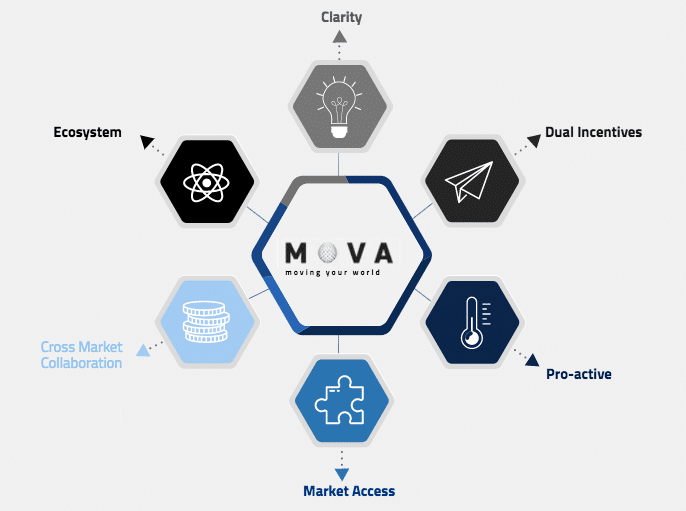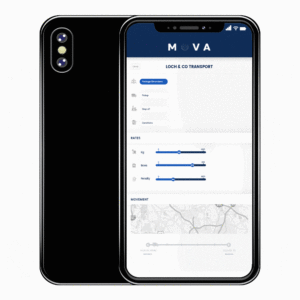Lachlan McDonald, MOVA Co-founder & CEO

Coin Central’s Steven Buchko recently spent an afternoon (or morning for Lachlan) speaking with MOVA co-founder and CEO Lachlan McDonald. Living in Australia, Lachlan has a rich history in supply chains working with companies such as BHP Billiton and Loch & Co.
Now, Lachlan and his MOVA team want to connect disjointed supply chain entities and bring accountability to the space in the best way they know how – through blockchain. In this interview, we dive into the motivations behind this new blockchain company and how logistics systems can benefit from the decentralized technology.
The Interview
SB: How did you first get involved with blockchain technology and cryptocurrency?
LM: Funny story, actually – they are two parts to it. First, I’ve been hearing about blockchain for quite a while. In my regular job, I work in contracts and procurement for firms like Boston Consulting and BHP Billiton. What I do for them is transform supply chains.
I heard a lot about blockchain, but I hadn’t seen any practical, real-world technology that’s working at the moment. The big guys that are using it are all optimizing for themselves. There’s Maersk, but they’re optimizing it for Maersk, not for global supply chains in general.
I had this in the back of my head when I took my kids to Disneyland a couple months ago. My cousins in America were really into crypto, so I’d heard of Bitcoin and other cryptocurrencies. They were really into all the new, cool stuff coming out with the technology, and they wanted to run it past me to get my take on what things they should invest in.
After repeated attempts to get me to check it out, I sat down and took a look at where the markets were at. I wanted to see if the technology was operational. Did they have real-world clients and if so, who were those clients? Are they big Fortune 500 companies or are they a small trucking company out of Minnesota. Nothing against the trucking company out of Minnesota, of course.
There seemed to be a real absence of practical engineering solutions to real-world problems. There was this very well marketed, exciting technology that could potentially revolutionize a whole range of different areas – financing, person-to-person value transactions, business-to-person value transactions, and intermediary removal. A lot of that was really exciting.
But, having been on the business end of trying to make technical change happen for companies worth 30 or 40 billion dollars, I know it’s really hard. When you have to rely on people and behavioral change, that’s where stuff breaks down. The tech can be cool, but unless it works in a real-world environment, it’s pretty challenging.
So, I turned to my cousin and said, “I think we could do this better.” I knew that the distributed ledger of blockchain would give me the ability to operate smart contracts. As long as you’ve got the engineering problem nailed, you could deploy this stuff out and start generating real-world products for customers. That’s where my practical experience comes in.
This company [MOVA] was born in trying to mesh those two worlds together. The problems that I’ve seen in the global supply chain throughout my career and a practical use of the technology in trying to get it into real-world customers’ hands now.

I completely agree with you. You need to have that focus on real-world use cases to get actual adoption, especially in supply chains. How is MOVA accomplishing this?
At its core, MOVA is an application that makes moving things easier. Moving things is hard, currently.
Enterprise companies have large, complex supply chains and move millions of items a year. If anything is late, the downtime is usually measured in hundreds of thousands of dollars an hour.
What we do is really quite simple. We utilize smart contract technology to link supply chain parties up and get them to agree to clear terms because often, that’s where it all goes bonkers. For example, the director of authority should be here on Thursday, but it was actually Wednesday and somewhere in the middle, it all broke down. So, they agree to clear terms, and those terms are executed autonomously on the blockchain.
The great thing about leveraging smart contracts is that it gives us real-world performance tools. If the item left late and the performance of the truck driver is below par, you pay less. When forming the contract, you can select a range of penalties in case they’re late.
We’ve managed to get the Ethereum blockchain smart contract platform to integrate with real-time, real-world GPS technology from a range of platforms. It gives you visibility into where your fleet is at any moment. It also gives you performance history, so you can look back and gather logs.
Another example: those ten loads that were late last month wasn’t actually a truck driver’s fault, it was my warehouse. You can see that the queue times at the warehouse are terrible.
MOVA is threefold. It gives you clarity for the delivery terms, automates the execution of those delivery terms, and gives you real performance tools.
Additionally, sales for transportation companies are currently paid out in 60 to 90-day terms. This leads to significant cash flow problems that can cause a company to go bankrupt. Because these companies have to factor in the risk of receivables when setting rates, their base rates rise to above normal market price. With MOVA, their payment terms will go from 60 to 90 days to essentially instant.
This will have a reduction in costs for both the customer and the client because it’s stripping out all those risk premiums everyone’s putting in. The client is putting risk premiums in because they need everything there tomorrow. They usually have very poor delivery schedules and their systems don’t interface well with the transportation company’s systems.
Can you tell me some examples of who would most benefit from MOVA?
Last year, I worked with one of the world’s largest manufacturer of mining and construction equipment. They have millions of deliveries, but over 82% of those deliveries were express freighted when less than 5% of them should have been. Every time you express freight something, on average, it’s 25% more costly.
There are two ways to accept that. First, people can put their transactions end to end on the blockchain. This can be a little tricky with people swapping payment terms over. They’d get our automated tools.
The second part is they can just have the reporting and real-time dashboard functions. This gives them a monthly report on everything that was late (or early) and why it was late (or early). If I had that in my past life, that would have been an exceptionally powerful tool.
My vision for this, though, is that as you connect those supply chains, you break down the barriers between vendors and customers.
We want to provide an online, e-auction platform that has real-time requirements and performance data on it. You’ll be able to see the rating of the people that you’re inquiring. You’re not going to have large tendering costs and large contract management expediting costs because you’ve got real-time performance tools, and you can see their transaction performance history which is much more powerful than doing some kind of tender.
If you need an urgent delivery, you can essentially auction it. You can bid it off to anyone in that area that’s capable of completing that for you. Currently, there may be 15 suppliers that can do that in your region, but you don’t know their numbers.
Connecting these parties through the auction lowers the total cost per kilo for all of the people that have something on that truck. It also makes the truck cheaper for the transport company to run as well as well as lowers the effect on the environment.
[thrive_leads id=’5219′]
I love the tie-in with GPS systems. Do you have any plans to tie in with other types of IoT (Internet of Things) devices to help ensure quality as well?
That’s an excellent point. Yes, IoT is going to be incredibly beneficial for us down the track as it continues to develop. It’s not just going to be a quality angle for us, though. If we have more accurate real-time telemetric data from a greater range of data points, it’ll allow a more accurate representation of what the requirements or the capacity is at any time in that marketplace.
We’re essentially trying to take every square foot on every truck and every career van and every ship potentially in the world and create a new market. We want to democratize that and allow a free market to utilize that space more effectively.
Currently, you can see where a truck’s going, how fast it’s going, etc. But, if you’re able to have a greater understanding of where the boxes are related to each other on a truck, you can then start stacking them in a more efficient order as well. You’ll then be able to send orders through to any freight forwarding companies or any customers that would have used intermediaries in the past.
Those IoT connected devices should now be able to replace that intermediary by triggering redactions themselves. It can tell you that the truck with the package is coming down the road and when it will arrive. That then triggers a cascade of events – not just with the vendor that you’ve got that one particular package with but with the multiple vendors and the multiple customers that are plugged into that same supply branch.

What pieces of skepticism, if any, have you heard of when reaching out to potential clients?
Actually, that’s been one of the most exciting parts of this project and why I have split it into a powerful, essentially free-to-utilize tool. We charge a small transaction fee for the transactions that come through, but the tool is free to download.
I’ve spoken with two of the three largest mining companies in the world. I’ve also spoken with the largest transport insurance company in the Asia Pacific region. They’ve all requested trials, and we are currently doing a real-world trial with our smart contract at Hastings D&E, one of the world’s largest Caterpillar dealers and one of the largest companies in Australia.
Our smart contract is operational, and we’ve worked with them to refine the user interface, workflow process, and also the management reporting process.
We’ve been conducting trials with them since January and they’re going very well. It shows that we’re showing some kind of real-world impact.
That’s our philosophy. It’s got to work for the guy that’s in a warehouse at 3 am, and he’s totally buggered.
The tool’s got to be simple, effective, and he has to go, “This is going to make my job easier. It’s going to make my life easier.”
When the customer of a transport companies sees the product and says, “Wow, I can actually have real-time performance tools to incentivize the right behaviors. I want this package delivered in full, on time, and not broken, and I can see how that has occurred.” That’s incredibly valuable.
What factored into your decision to build on top of Ethereum over other platforms or even building your own blockchain?
Excellent point. While I was in LA, I was reading whitepapers and also going through source code. Ethereum, to me, looked like it had the most useful, practical, and tested smart contract tools available to use.
I’d gone and met the NEO guys and talked about where they’re at. That project’s really exciting. I think their functionality is going to be really cool, but they were in a different place then what I needed. I needed a proven solution that works now.
As we’re going through this process, it looks like the majority of smart contracts that are currently out there and operational are fairly simple in a transactional way. It’s transacting value from one party to the next with some kind of subcontract functions that could check some balances, or maybe check someone’s transaction history, but that’s really it as far as operational products that I am aware of.
What have been some of your challenges in building out MOVA?
The tricky part is getting the front-end to work in a simple and elegant way. The one that we have written is capable of taking a complex conditional dataset on where a transaction is triggered and who the accounts are that triggered the transactions.
It pulls in all the information about the variable rate structures, and it can cull data in regard to where it pulls variable-rate structures from. There’s a range of conditions on ensuring that you get the right truck for the right job. If you get a wrong truck, it’s more cost and more time.
From there, we trigger all the performance elements via the GPS system. Then, it essentially gives you some flags along the way. For example, it will tell you if a package is behind, the reasoning, and asks you what you’d like to do about it.
I don’t want to back people into a corner with a system that isn’t smart and automatically docks pay for everyone that’s a second late. Nobody wants that. That’s not driving the right behaviors and people that are smarter than me will find ways around it.
What’s next for MOVA?
We’ve tested the product, and it’s operational. We have a trial front-end that a client is running through and utilizing dummy transactions to test the functionality.
We’re going to push this to more operational customers within the next three months. But, when this goes live, we want this to be a tool everyone picks up and goes, “God, why wasn’t this invented before? It’s so simple and easy to use.” What’s great is the feedback that I’ve gotten so far is that’s how people are already approaching it.
Is there anything else that you’d like our readers to know?
A couple of things. One is that our philosophy is that we’re a real-world engineering solution. We’ve got real-world operational trials at the moment to get this technology right.
The team that I’ve put together, essentially ex-McKinsey, ex-Boston Consulting, Amazon and IBM guys, all think like I do in that we want to lead, not follow.
It’s important for us to ensure that we’re transparent and the product’s real because, personally, I think a lot of the technology that’s out there is incredibly exciting, but there’s a culture behind the marketing hype at the moment that makes a lot of people not jump in for the right reasons. I want to make sure that the tech is at least working on a trial basis, we put together a team that’s truly invested in making this work, and that we have experience instead of trying to put people on the team with as many fancy colleges as possible. Probably being a bit cheeky now.
Thank You
Cheeky indeed, Lachlan, but that’s alright – cheeky is good. Thank you again for getting up at the crack of dawn to speak with us. We look forward to your launch and wish MOVA the best of luck!
Is there a project founder that you’d like us to interview? Send us a tweet @realcoincentral with your suggestions.







